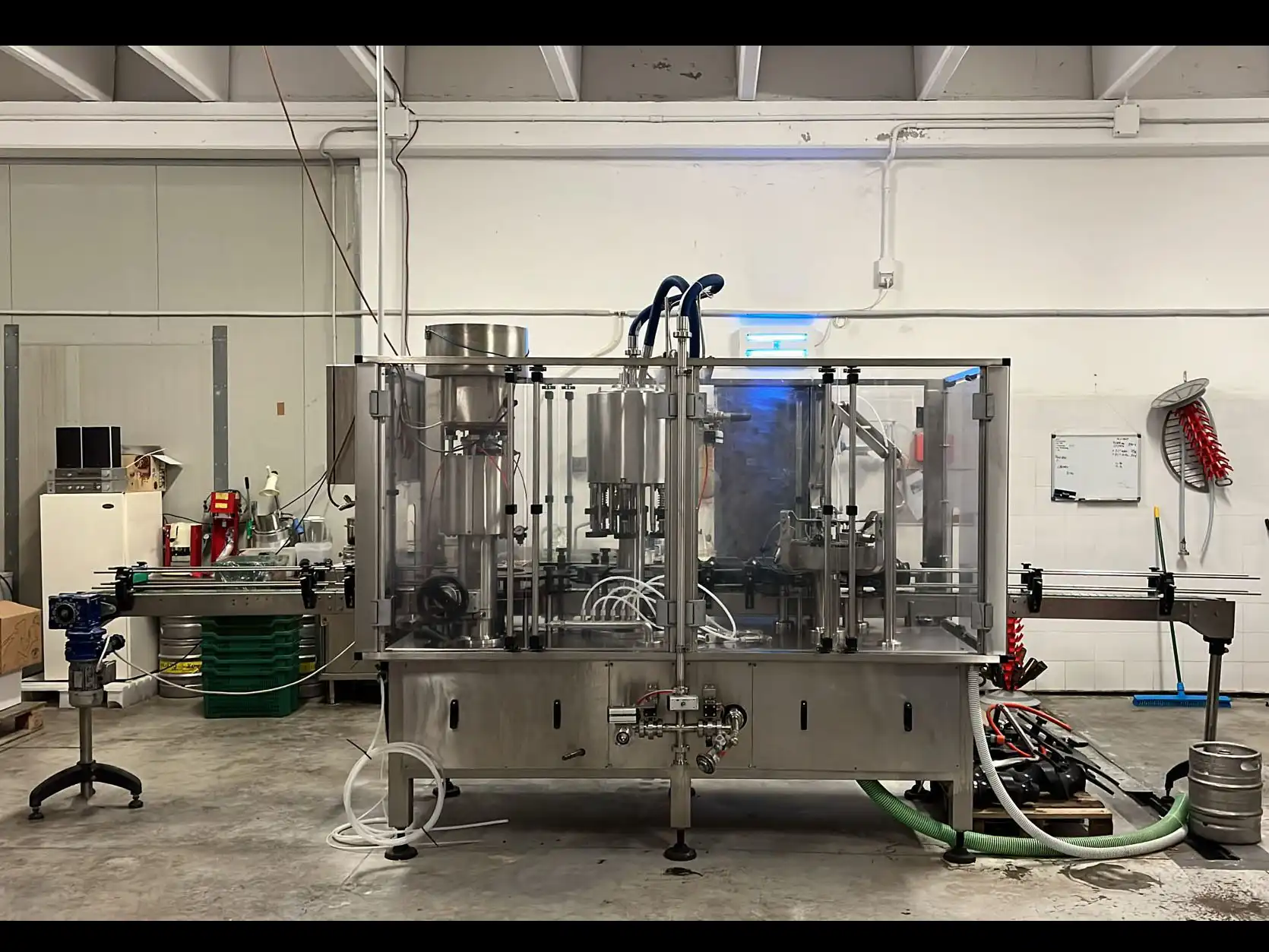Description
Used Filling Monoblock CEM 6-6-1 for fermented beer 1000 bph
The Used Filling Monoblock CEM 6-6-1 for fermented beer 1000 bph, built in 2012, has an operational system for filling fermented beverages and still wine. Consequently, this machine produces 1000 bottles per hour and maintains high-quality standards through rigorous maintenance and a robust component design.
Introduction to the Filling Monoblock
The filling monoblock for beer 1000bph integrates three main subsystems to create a continuous, streamlined workflow for washing, filling, and capping operations. Notably, the machine rotates in a clockwise direction, and therefore, this feature positively influences internal flow dynamics and process synchronization. In addition, the filling monoblock 1000bph supports efficient production and minimizes cycle times.
General System Specifications of the Used Filling Monoblock CEM 6-6-1 for fermented beer 1000 bph
The monoblock processes specific bottle formats with high efficiency. Specifically, it handles longneck bottles with a capacity of 0.33 L and Belgian bottles with a capacity of 0.75 L. Moreover, engineers incorporated 6 dummy bottles for circuit sanitization to ensure strict adherence to hygienic standards. Furthermore, the integrated operation of washing, filling, and capping within a single module enables the machine to achieve the output of 1000 bottles per hour. As a result, production remains highly streamlined and cost-effective.
The Rinsing Unit
The rinsing unit of the Filling monoblock for beer initiates the filling monoblock process and equips itself with 6 grippers to handle each bottle. First, it executes a single treatment cycle for each bottle, and then it cleans every bottle meticulously before the filling process begins. This method upholds high hygienic and quality standards. Additionally, the rinsing unit prevents contamination and promotes reliability in subsequent processes.
Technical Aspects of the Rinsing Unit
Gripper Configuration: The unit employs 6 grippers that handle each bottle precisely and in a controlled manner.
Single Treatment Cycle: The system cleans each bottle individually, which significantly enhances cleaning efficiency and process reliability. Consequently, it improves overall production quality.
The Filling System
The filling phase uses a configuration with 6 valves evenly distributed along the monoblock, and it applies a gravity filling method with a fixed nozzle. Specifically, engineers designed this configuration to control the liquid flow accurately, and it adapts seamlessly to the different bottle formats—the longneck (0.33 L) and the Belgian (0.75 L). Accordingly, the arrangement of 6 valves and the gravity filling method enable the machine to meet the high throughput of 1000 bottles per hour. Moreover, it minimizes liquid waste and delivers consistent fill volumes, which further enhances the system’s efficiency.
Operation of the Filling System
The gravity-based filling mechanism, combined with the fixed nozzle and the 6-valve arrangement, delivers precise volumes to every bottle. Thus, this design maintains product quality and meets varying production demands. In addition, it ensures that each bottle receives an accurate quantity of liquid, which improves consistency across batches. Therefore, production remains within strict tolerances.
The Capping Unit of Used Filling Monoblock
The capping unit secures product integrity by sealing each bottle airtight. It uses a single capping head designed for crown caps, and the system accepts cap sizes of 26 or 29 millimeters. Consequently, this mechanism seals each bottle securely, preventing contamination and preserving the organoleptic and microbiological properties of the filled beverage. Furthermore, reliable capping enhances shelf stability and customer satisfaction.
Technical Details of the Capping Unit
The capping system seals every bottle properly, thereby creating a critical barrier against external contaminants. In particular, operators value this precise sealing process for fermented beer and still wine, where product integrity matters significantly. Additionally, the consistent capping performance contributes to the overall operational efficiency of the line.
Maintenance and System Versatility of Filling monoblock for beer
Technicians follow a strict preventive maintenance schedule and perform regular technical inspections on this used Filling Monoblock by CEM. As a result, this proactive maintenance approach enhances operational reliability and minimizes machine downtime. Moreover, the durability of the system components and continuous updates to safety standards ensure that the machine runs efficiently in high-demand production environments. Furthermore, these measures lead to extended machine life and consistent performance.
Advantages of Periodic Maintenance
Operational Reliability: Regular maintenance minimizes unexpected downtime and sustains optimal machine performance.
Enhanced Process Safety: Continuous monitoring of system components ensures that the production process of the Filling monoblock for beer meets hygienic and operational standards for both fermented beverages and still wine.
Cost Efficiency: Consequently, the reduced downtime saves time and minimizes repair expenses.
Versatile Application for this used filling monoblock for fermented beer
The technical configuration allows the Filling monoblock for beer CEM to fill not only fermented beer but also still wine. Therefore, companies benefit from this versatile production line as it adapts to various beverage types while consistently meeting high production standards. In addition, the system’s flexibility supports diverse product lines, thereby expanding its market applicability.
Conclusion of the Used Filling Monoblock
In summary, the Used Filling Monoblock CEM 6-6-1 for fermented beer 1000 bph exemplifies an advanced technological solution in the industrial bottling sector. Engineers integrated washing, filling, and capping functions into a single monoblock to deliver high performance and continuous operation. Consequently, the CEM filling monoblock’s comprehensive technical specifications and its commitment to preventive maintenance demonstrate its reliability and versatility. Furthermore, professionals in the beverage production industry can rely on this robust system to meet evolving production demands. Ultimately, the combination of innovative design and proactive maintenance ensures that this machine remains at the forefront of bottling technology. Currently, it is possible to view this filling monoblock in production.

